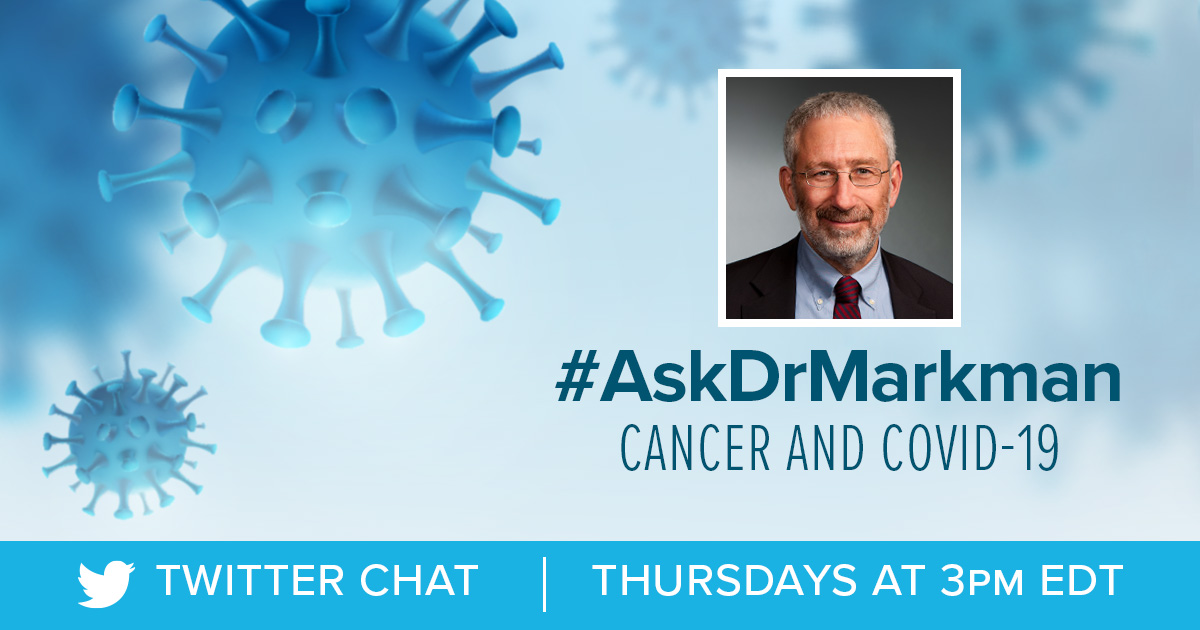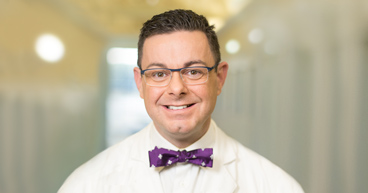
The COVID-19 pandemic has created a confusing landscape of constantly evolving information and developments. Cancer patients have many questions about how the virus may affect them, their health and their access to ongoing treatments, among other considerations. Maurie Markman, MD, President of Medicine & Science at Cancer Treatment Centers of America® (CTCA), has launched a weekly Q&A hosted on Twitter to answer your questions, in real time and as questions are sent to us online and by phone. Follow us on #AskDrMarkman. Here’s this week’s chat:
Q: Are cancer screenings or treatments safe now, or should I delay?
A: Routine screenings absent concerning symptoms, like annual mammograms and 10-year colonoscopies, may safely be postponed for at least several months. But diagnostic exams, which look for cancer after specific symptoms have developed, should not be unreasonably delayed. If you’re in active treatment, undergoing surgery or chemotherapy, for example, those should not be delayed.
Learn more about the difference between screening and diagnostic tests
Q: I’ve heard reports about workers in meat-packing plants getting COVID-19. Do I have a higher risk of getting the virus as a cancer patient if I eat meat?
A: There’s no evidence that people can get COVID-19 from eating meat or handling its packaging, or specifically that cancer patients are at a greater risk. Check for U.S. Centers for Disease Control and Prevention (CDC) updates on specific recommendations regarding the food supply.
Q: As a cancer patient, is the risk higher for several consequences?
A: Because they are often immune-compromised, cancer patients in general have an increased risk of contracting the virus and experiencing more severe symptoms. However, there’s no evidence that the risk varies by cancer type. Also, because certain blood cancers, like leukemia and lymphoma, often start in the bone marrow, disrupting the normal production of immune cells, patients with these cancers may be at a higher risk of experiencing serious symptoms.
Q: If I have cancer, is it safe to have an X-ray knowing other people have used this machine?
A: Your concern is understandable, but you may be comforted to know that standard protocols require those performing your X-ray to take necessary precautions to keep you safe, including carefully cleaning surfaces and regularly screening staff for COVID-19. That said, you should feel comfortable discussing any concerns with your physician or the radiologist or radiology technician performing the X-ray. To allay your concerns, ask them what steps they’re taking to keep you safe.
Q: I’m taking immunotherapy to treat my cancer. Will this treatment protect me from getting COVID-19 because it’s using my immune system to fight the cancer?
A: That’s a very interesting question, but there is no evidence to suggest immunotherapy will reduce the risk of contracting the virus or the severity of its symptoms. If you have any concerns about the impact your cancer or its treatment will have on your COVID-19-related risks, you should feel free to discuss them with your physician.
Q: I have recently completed cancer treatment. Should I be taking hydroxychloroquine to prevent getting COVID-19?
A: There is currently no medically reliable evidence that this drug, widely used for malaria and other medical conditions, is of value in preventing COVID-19 infection. It’s also important to know that this particular drug may cause serious side effects.
Q: My friend recently tested positive for the BRCA gene, which gives her a higher risk of breast or ovarian cancer. Does she also have a greater risk of developing COVID-19?
A: There is no evidence to suggest that any genetic profile increases or decreases the risk of COVID-19. If your friend is concerned about her cancer or COVID-19 risks, she should talk to her doctors, who would know the specifics about her individual situation.
Q: If I’m undergoing cancer treatment, how can I feel safe that my health care providers don’t have COVID-19?
A: Health care providers around the country, including those providing care to cancer patients, are taking extraordinary precautions to protect their patients as well as their colleagues. But if you have any concerns about your safety, ask your care team about the specific steps they’re taking to protect you from contracting the virus.
Q: I’ve been told I need a biopsy to see if I have cancer. Is it safe to have this procedure now, or should I wait for the COVID-19 outbreak to subside?
A: It’s highly likely your clinical team is recommending a biopsy because they believe it’s in your best interests. Typically, your team makes recommendations after weighing concerns about the virus against concerns about delaying diagnosis and treatment. But if you’re concerned about the timing of the procedure and want to know whether it can be delayed, talk to your physician. He or she will be able to answer your question based on the specifics of your situation.
Q: If my state relaxes travel restrictions, will it be okay for me to travel if I have cancer?
A: Every patient’s situation is different. If you have questions about traveling safely, it’s essential to ask your clinical team for recommendations. Also check for updated guidelines from CDC or national cancer organizations, such as the American Society of Clinical Oncology or The American Cancer Society.
Q: If I’ve recovered from COVID-19, am I immune from getting the virus again?
A: Available evidence would suggest that if a patient has recovered from COVID-19, he or she will not be at risk for a second infection, but how long this protection lasts is currently unknown.
If you are a cancer survivor or in active treatment and are concerned about how the COVID-19 situation may impact you or your care, please contact your care team.
Learn why the COVID-19 outbreak gives you another reason to quit smoking.



